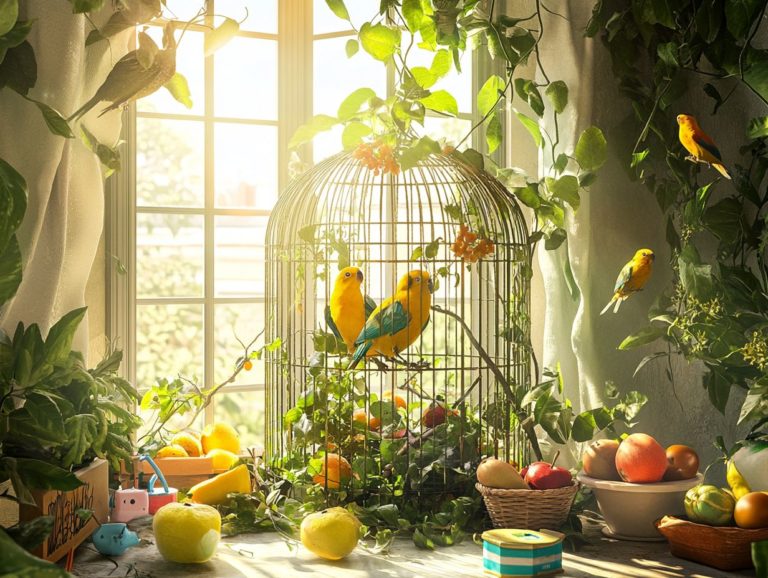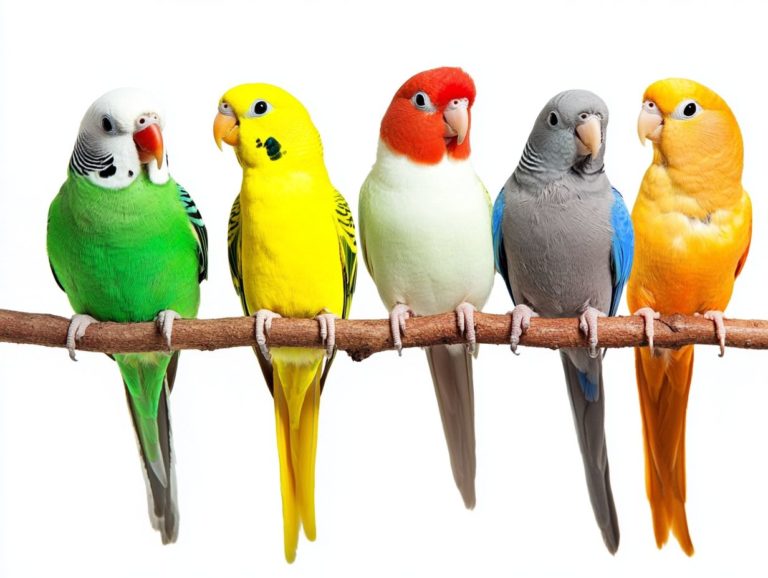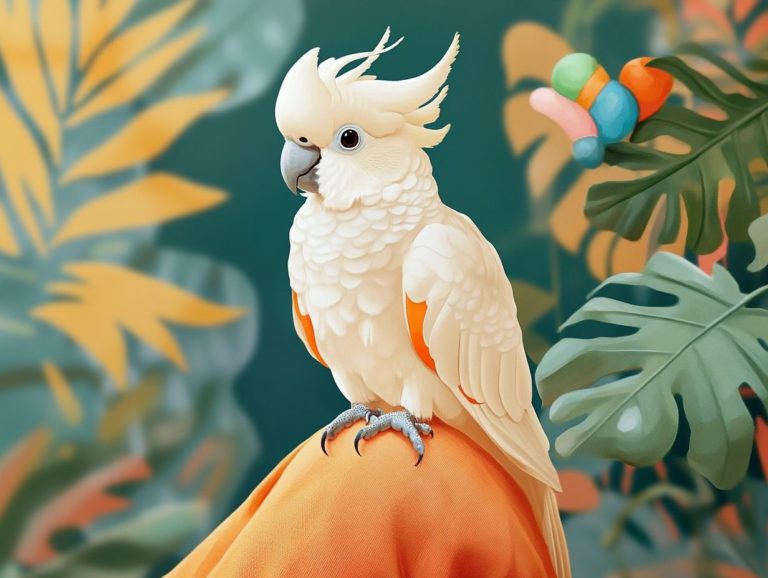Signs Your Finch Is Happy and Healthy
Understanding your finch’s behavior is crucial for ensuring their well-being and happiness. This guide equips you with the tools to distinguish between normal and abnormal behaviors. It will help you recognize when your finch is content or feeling stressed. It s also essential to observe signs of illness early, as they can indicate health concerns.
You ll uncover key indicators of a happy and healthy finch, alongside common health issues to monitor and tips for creating the perfect environment.
Learn how to deepen your bond with your finch, fostering a fulfilling companionship.
Jump in and boost your finch care skills now!
Contents
- Key Takeaways:
- Understanding Your Finch’s Behavior
- Signs of a Happy Finch
- Signs of a Healthy Finch
- Common Health Issues in Finches
- Maintaining a Healthy Environment for Your Finch
- Building a Bond with Your Finch
- Frequently Asked Questions
- What are some signs that my finch is happy and healthy?
- How can I tell if my finch is feeling stressed or unhappy?
- Does my finch need any special care to stay happy and healthy?
- What should I do if I suspect my finch is sick or injured?
- Do I need to take my finch to the vet for regular check-ups?
- Can owning a finch improve my overall well-being?
Key Takeaways:
- Look out for physical and behavioral cues to understand your finch’s happiness and health.
- A happy finch will display active and curious behavior, along with a healthy appearance and appetite. This is crucial in preventing common issues such as feather loss and mites.
- Keep your finch healthy by providing a balanced diet, proper care, and a positive bond with you as their owner.
Understanding Your Finch’s Behavior
Understanding your finch’s behavior is essential for you as a pet owner. It enables you to spot any changes that might signal health concerns. Like other birds, finches communicate their well-being through various behaviors, and recognizing these patterns can significantly enhance your care for your feathered friend.
By observing your finch’s daily routines whether it’s feeding, interacting with others, or cleaning their feathers you gain valuable insights into their overall health and happiness. Any deviations from their usual antics could indicate sickness or distress, prompting you to seek guidance from experts like Jeff Jones in Nashville or to consult trusted resources such as BirdOculars.
Normal vs. Abnormal Behavior
Normal behavior in finches includes singing, socializing, and engaging in playful activities, while abnormal behavior may manifest as lethargy or feather loss, which could indicate illness.
When you observe finches actively chirping and interacting with their peers, it s a strong indicator of their well-being. These vibrant birds often spend time preening each other, showcasing their healthy social bonds. However, if you notice them appearing isolated or reluctant to eat, these are potential warning signs not to be overlooked. A balanced diet rich in seeds, fresh fruits, and greens is essential for their vitality.
Any dramatic changes in appetite, excessive sleeping, or an unkempt appearance can serve as health indicators that require your immediate attention. By carefully monitoring these behaviors, you can ensure that your finches thrive in their environment.
Signs of a Happy Finch
A joyful finch reveals its emotional well-being through lively play, cheerful vocalizations, and consistent grooming. When you observe your finch engaging with toys or socializing with its companions, you gain valuable insight into its happiness.
These behaviors not only signify a positive state of mind but also play a vital role in their overall health and ability to fend off common illnesses. By creating a stimulating environment filled with a balanced diet and engaging toys, you enhance their quality of life. It is essential for you, as a caring pet owner, to ensure these elements are always in place.
Physical and Behavioral Indicators
Physical indicators of a happy finch include bright plumage, alertness, and regular grooming. When you observe these delightful creatures, you may notice how frequently they clean their feathers. This essential ritual maintains both hygiene and comfort.
This grooming routine not only keeps their plumage pristine but also acts as a bonding activity among finches, strengthening their social ties. Engaging in playful behaviors, such as swinging on perches or exploring new environments, showcases their curiosity and zest for life, which significantly contributes to their overall well-being.
Each of these signs provides a glimpse into the joyful nature of finches and their vibrant personalities.
Take a moment each day to observe your finch and see how these signs of happiness can lead to a healthier, happier bird!
Signs of a Healthy Finch
Recognizing the signs of a happy pet bird is crucial for dedicated pet parents. This ensures these delightful finches thrive in their environments.
A healthy finch often showcases vibrant feathers, exhibits lively behavior, and maintains a proper diet. For more insights, check out the top 10 signs of a healthy pet bird, as these are key indicators of good health.
Regular veterinary check-ups and attentive care play vital roles in preventing potential health issues.
By understanding these signs, you can take proactive measures to create a nurturing environment that allows your finches to truly flourish.
Physical and Behavioral Indicators
Physical indicators of a healthy finch include bright eyes, smooth feathers, and a well-maintained diet. Behavioral indicators encompass active movements and vocalizations.
These signs are essential for you to observe regularly. They offer valuable insights into the overall well-being of your feathered companion.
Understanding the importance of a well-rounded diet and proper care will help prevent issues like mites and dietary deficiencies. An interactive finch, one that engages in frequent chirping and playful antics, typically indicates a state of contentment and health.
Sudden changes, like lethargy or alterations in appetite, could signal underlying health issues that require your attention.
By closely monitoring both the physical and behavioral aspects, you can promptly address potential problems. This ensures that your pet enjoys a happy and fulfilling life while preventing complications from overlooked health concerns.
Common Health Issues in Finches
Common health issues in finches can arise from various sources, including mites (tiny parasites that can irritate your finch’s skin), dietary deficiencies, and diseases that could jeopardize their overall well-being.
Be vigilant for signs of health concerns, such as feather loss or lethargy.
Prompt consultation with a veterinarian can ensure effective treatment. By understanding these potential issues, you empower yourself to intervene timely and develop better care and prevention strategies.
Identifying and Treating Common Ailments
Identifying common ailments in finches, such as mite infestations or avian poxvirus (a virus that affects birds), requires keen observation skills to detect symptoms like feather loss or changes in behavior.
These signs may often be subtle, making your understanding of them crucial for early detection and intervention. Watch for additional symptoms such as lethargy, difficult breathing, or abnormal droppings, as these could indicate underlying health issues.
Accurate identification not only helps you determine the appropriate course of treatment but also emphasizes the importance of seeking veterinary care without delay.
Incorporate preventive measures, such as maintaining a clean living environment and offering a balanced diet rich in vitamins. This is essential for keeping these vibrant birds healthy and thriving.
Schedule regular check-ups with a vet who specializes in birds. This can further enhance their wellbeing, ensuring that potential problems are addressed before they escalate.
Maintaining a Healthy Environment for Your Finch
To ensure a thriving environment for your finch, focus on providing an ideal habitat, a well-rounded diet, and consistent care. These elements play a crucial role in their overall well-being.
Craft a spacious and clean living space. Offer a balanced diet that includes seeds, fruits, and protein sources such as mealworms.
Incorporate regular grooming and introduce engaging toys. These can significantly elevate your finch’s quality of life. Your finch deserves the best!
Don t wait! Make these changes today to create a happier home for your finch.
Proper Nutrition and Care
Proper nutrition and care for your finches center around delivering a well-balanced diet packed with seeds, fresh fruits, and protein sources. Regular grooming is also essential to maintain their overall health.
It s crucial to ensure your finches have access to clean water for hydration and digestion. Offering a variety of seeds helps prevent dietary deficiencies. Finches particularly thrive on specific seed mixes full of vitamins and minerals that enhance their growth and vitality. Fresh fruits and vegetables enrich their diet and encourage their natural foraging instincts.
Providing opportunities for your birds to bathe is equally essential. This practice keeps their feathers in top condition and promotes hygiene, preventing skin issues. Make it a habit to check their health regularly to catch any potential problems early. This ensures that your finches enjoy a joyful and prolonged life.
Building a Bond with Your Finch
Building a strong bond with your finch demands a commitment to consistent interaction and positive reinforcement. Introduce engaging toys that spark their curiosity and cater to their social nature.
Treating your finch with delightful snacks like millet spray, mealworms, or crickets can enrich this relationship, helping them associate you with enjoyable experiences.
As trust deepens over time, you may notice your finch displaying affectionate behaviors. This transforms your companionship into a truly rewarding experience for both of you.
Creating a Positive Relationship
Creating a positive relationship with your finch requires consistent care. Focus on their diet, habitat, and social needs.
Provide toys and perches that offer comfort and enrichment. Engage in gentle interactions to recognize their social needs.
Establish daily routines such as feeding and cleaning. This helps your finch feel secure and cherished.
Incorporating a variety of stimulating toys, such as swings and mirrors, encourages playful exploration. Thoughtful playtime not only keeps them physically active but also sharpens their mental agility. Observing their behaviors during these interactions offers valuable insights into their preferences, which can help in providing the right care.
Frequently Asked Questions
What are some signs that my finch is happy and healthy?
- Healthy appetite.
- Active and alert behavior.
- Vocalizations indicating their mood.
- Clean and well-groomed appearance.
How can I tell if my finch is feeling stressed or unhappy?
- Decreased appetite.
- Lack of vocalizations.
- Fluffed up feathers.
- Lack of activity.
Does my finch need any special care to stay happy and healthy?
Aside from a balanced diet and clean living environment, finches need social interaction and mental stimulation. Consider providing toys, perches, and companions for your finch.
What should I do if I suspect my finch is sick or injured?
If you notice any changes in your finch’s behavior or appearance, don t wait to seek veterinary care! Delaying treatment can worsen the condition and potentially put your finch’s health at risk.
Do I need to take my finch to the vet for regular check-ups?
While finches may not require routine check-ups like other pets, it’s still essential to monitor their health. Annual check-ups can help catch any potential health issues early on.
Can owning a finch improve my overall well-being?
Have you ever wondered how a little bird can brighten your day? Spending time with pets, such as finches, can boost your mental and emotional health.
Caring for a pet creates a strong bond that brings joy and reduces stress. A finch could be the perfect companion to help you feel happier.



